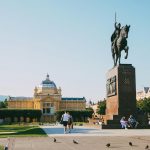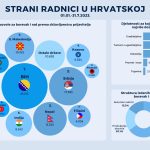The visit by the Croatian delegation has caused an uproar from Russia.
During a two-day working visit to Kiev, members of the Croatian government’s working group for cooperation between Croatia and Ukraine presented the Croatian model of successful and peaceful reintegration of the Ukrainian territory, said on Friday at a press conference at the Foreign Ministry members of the delegation, pointing out that Croatia was doing nothing outside of the Minsk process and had “no hidden agenda,” reports tportal.hr on September 2, 2017.
“We have presented our experiences in the implementation of the demilitarisation of territory, the establishment of a transitional police, the application of amnesty, the implementation of local elections, in short – the establishment of normal life,” said the chairwoman of the working group Vesna Škare Ožbolt.
Joško Morić, a member of the working group, stressed that the visit took place within the framework of the fact that, “on the one hand, Ukraine is a subject of international-legal and political relations in its internationally recognized borders and, on the other hand, that presidents of the Russian Federation, Ukraine and France and the German Chancellor have confirmed that they respect Ukraine’s integrity and territorial sovereignty and firmly believe that a peaceful solution to the problem has no alternative.” “What we did and said in Kiev we can repeat in Donetsk, Lugansk, Moscow or Berlin,” said Morić.
State Secretary at the Foreign Ministry Zdravka Bušić also stressed that, when it comes to relations between Zagreb and Moscow, Croatia had “no hidden agenda” and that the Croatian model of peaceful reintegration of the Croatian Danube region has drawn considerable interest from the UN in resolving the problems from Georgia to Syria.
Vesna Škare-Ožbolt believes that Croatia has a moral obligation to try to help establish peace in the Ukrainian East, and stresses that the peaceful reintegration of the Croatian Danube region was the most successful UN peacekeeping mission ever. “Moscow and Kiev know that quite well,” said Škare-Ožbolt, pointing out that both Russian and Ukrainian soldiers participated in the UN peacekeeping mission in Croatia.
However, it seems that Russia is of a somewhat different opinion. The Russian Foreign Ministry issued a statement about the Croatian delegation’s activities in Ukraine. “We have noted the contacts between Ukrainian authorities and former Croatian Minister of Justice Vesna Škare-Ožbolt, former Deputy Interior Minister Joško Morić and former Head of the Directorate for Expellees, Returnees, and Refugees Lovre Pejković who arrived from Zagreb, at the end of August in Kiev. Judging by the information available from the media, the issues discussed at the meetings included the ‘return of occupied territories’ based on Croatia’s experience of the 1990s. That experience is more than controversial, it is negative, to put it bluntly. Suffice it to recall the approximately 250,000 Serbian refugees, forced out of Croatia by the military operations carried out by Zagreb in 1995, and the numerous civilian casualties.
Regretfully, their assurances of ‘good intentions’ and ‘the need to restore mutual trust’ in the conflict areas were used as a guise to make dangerous statements about ‘compulsion’ and the ‘acceptability’ of certain ‘methods of peaceful reintegration.’ Of considerable concern is the fact that Kiev seems eager to pick up on such signals, demonstratively ignoring its own clearly stated obligations under the Minsk Package of Measures. Therefore, any mention of scenarios for Donbass involving force would be especially damaging and immoral now, in the first days of the ‘school truce’ confirmed in the Normandy format.
Guided by our desire to develop friendly relations with Croatia, we urge Zagreb to use every opportunity to encourage Kiev to consistently and unswervingly implement the Minsk Agreements in the interests of expediting the peaceful settlement of the domestic Ukrainian crisis, and the durable stabilisation of southeastern Ukraine,” said the Russian Ministry of Foreign Affairs in its statement.







